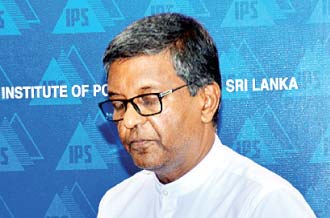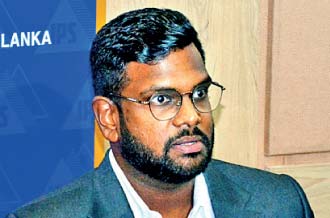Sunday Feb 22, 2026
Sunday Feb 22, 2026
Monday, 11 November 2024 04:28 - - {{hitsCtrl.values.hits}}

NIA Chief Innovation Officer Prof. Ajith De Alwis

Economist and CSF Co-Founder and Director Anushka Wijesinha

WIPO Director – Division for Asia and Pacific Andrew Michael Ong

WIPO Economics and Statistics Division Head of Section Dr. Sacha Wunnsch-Vincent

WIPO IP Finance and Valuation Specialist Michael Kos

WIPO Research Fellow Dr. Anmol Kaur Grewal
By Kushlani Nagahawatta
The National Innovation Agency (NIA) held the country launch of the Global Innovation Index (GII) 2024 on 5 November at the Institute of Policy Studies. The event centred on the theme “Prioritising Innovation in Sri Lanka’s Economic Recovery”, aiming to bring focus on how innovation can fuel the nation’s economic revival during these challenging times.
The Central Bank Governor Dr. Nandalal Weerasinghe, graced the event as the guest of honour. Two publications, the “National Commercialisation Guideline” and “IP into Rupees (Version II)” were also launched and presented to the guests at the event.
Setting the bar:
Sri Lanka’s mid-tier global ranking
Sri Lanka’s placement in the 89th position on the 2024 GII, higher by one notch from the previous ranking, reflects the need for significant progress in fostering a more innovative and competitive ecosystem. This ranking places Sri Lanka in the mid-range globally, a reality that the country must face, but one that can also serve as a catalyst for change and growth. The launch event brought to light the fact that global investors, policymakers, and international bodies will use such rankings to assess a country’s readiness for investments and partnerships.
Delivering the welcome address, the National Innovation Agency (NIA) Chief Innovation Officer Prof. Ajith de Alwis emphasised the critical role of innovation in Sri Lanka’s future, particularly in light of its current economic situation, “We must strive for a better position, one that reflects our true potential and aspirations.” He also noted the key purpose of the national launch—to raise awareness about the GII framework and sensitise decision-makers about its importance. He emphasised, “This is not a celebration, but an event to highlight the value of the GII and to ensure that we, as a nation, are aligned with the global standards of innovation.”
Presenting Sri Lanka’s performance in the GII 2024, National Innovation Agency Senior Innovation Officer Vindya Jayawickrama noted Sri Lanka’s fluctuating position in the Global Innovation Index, highlighting the need for stability and improvement in rankings to establish itself as a credible innovation-driven nation. “If we are to be a stable country, then we have to move forward with the ranking at least above 50.” Although Sri Lanka ranked 12th among 38 lower-middle-income economies and showed strong performance in innovation outputs relative to inputs, she noted there was much room to enhance critical areas like market sophistication and human capital.
She underscored the importance of reliable data, revealing that “out of 80, 22 indicators are outdated,” and called on national institutions to consolidate efforts in reporting accurate statistics, especially given that much of Sri Lanka’s data for the index comes indirectly from secondary sources. Jayawickrama also previewed the upcoming National Innovation Data Wall, designed to provide accessible and comprehensive information on the country’s innovation metrics, a critical tool she hopes will help Sri Lanka make significant strides in global rankings.
Strategic overhaul for a sustainable innovation ecosystem
Centre for a Smart Future Co-Founder and Director Anushka Wijesinha also spoke at the event, highlighting key priorities to advance innovation in Sri Lanka. He called for a modernisation of public research institutions to make them more impactful, emphasising the need for better allocation of current funds amid tight fiscal constraints. He urged that Government and public funding in innovation be streamlined. This reform, he believes, should involve rationalising outdated structures and focusing on public spending that aligns closely with firm needs and market-oriented services.
Moving to private sector engagement, Wijesinha stressed the importance of demand-driven reforms in enterprise-facing institutions, advocating for “market-oriented services for enterprises” and strategic Government support for green and social entrepreneurship. He suggested innovative financing, including IP-backed and green finance, and argued that Sri Lanka should strategically use Government procurement to support start-ups, noting examples like the US Government’s early support for companies like Tesla and SpaceX. He concluded with a challenge to the National Innovation Agency to align its goals with the SDGs and throw out annual challenges for the innovation ecosystem, driving towards “impact-focused policies” in a resource-constrained environment to nurture a dynamic entrepreneurial landscape in Sri Lanka.
Global perspective
Guest speaker at the event, WIPO Head of Section – Department for Economics and Data Analytics Dr. Sacha Wunnsch-Vincent explored Sri Lanka’s evolving journey in the innovation sector, crediting a decade of consistent effort and international cooperation for driving growth. According to the latest GII analysis, Sri Lanka’s performance reflects both positive advancements and areas for improvement. While research and development investment and international patent filings have shown a decline, Dr. Sacha noted that the country has seen a surge in venture capital deals—an achievement given the global downward trend in VC activity, though he cautioned that this trend should be carefully monitored to determine whether it reflects sustainable growth or isolated incidents.
Dr. Sacha emphasised the need for meaningful policy action as opposed to mere data collection, commending Sri Lanka’s proactive approach to strengthening its innovation ecosystem. While the country has made strides in ICT infrastructure, sustainable tourism, and creative outputs in digital and tech sectors, challenges remain. Despite a high number of science and engineering graduates, Sri Lanka struggles to fully utilise this talent in driving innovation. Key obstacles include limited R&D funding as a percentage of GDP and insufficient venture capital. Additionally, the decline in international patent filings and R&D investments—linked to global investment shifts and geopolitical factors—further underscores the need to channel Sri Lanka’s considerable human capital into sectors that can fuel technological advancement.
Investing in the intangible
Also speaking at the event, WIPO Research Fellow Dr. Anmol Kaur Grewal introduced WIPO’s new initiative, the “World Intangible Investment Highlights” report, which reveals that intangible investment among the covered economies grew three times faster than tangible assets between 1995 and 2023. This trend, she noted, highlights a shift towards software, data, and brands as leading investment areas, especially in countries like India and the US. “Despite crises and high interest rates, intangible assets continue to thrive as they are increasingly essential in today’s knowledge-based economy,” she stated. For Sri Lanka, she emphasised that investment in areas like digital platforms, workforce skills, and supply chain design would propel high-value tourism and enhance the competitive edge of the textile and apparel sector.
Unlocking IP value: Financing innovation
Adding to the discourse, WIPO IP Finance and Valuation Specialist Micheal Koss noted IP finance’s role in bridging a $ 17 billion financing gap for SMEs in Sri Lanka. “SMEs are vital to the economy, yet they often lack hard assets for borrowing,” he explained. Highlighting successful IP-backed lending initiatives globally, such as China’s $ 67 billion Patent and Trademark Pledged Lending in 2022, Koss noted that IP finance is rapidly gaining ground in countries like Korea, Japan, and ASEAN regions. “There is a fundamental shift in how IP and intangible assets are valued and used in financial contexts,” he added.
Koss also highlighted the nation’s potential, especially in high-value sectors like tourism and textiles. “Sri Lanka’s rank in intangible asset intensity is 67th in the Global Innovation Index, revealing a tremendous opportunity for growth,” he stated.
As Sri Lanka forges ahead in economic recovery, the GII 2024 launch underscored the critical role of innovation in driving both economic and social progress. Through a unified effort from Government, private sector, and academia, Sri Lanka can create a sustainable, thriving innovation ecosystem. The country may stand at 89th place today, but with focused policies on social entrepreneurship, data-driven decision-making, and global collaboration, Sri Lanka has the potential to climb the global innovation ranks and emerge stronger from its economic trials.
Pix by Upul Abayasekara